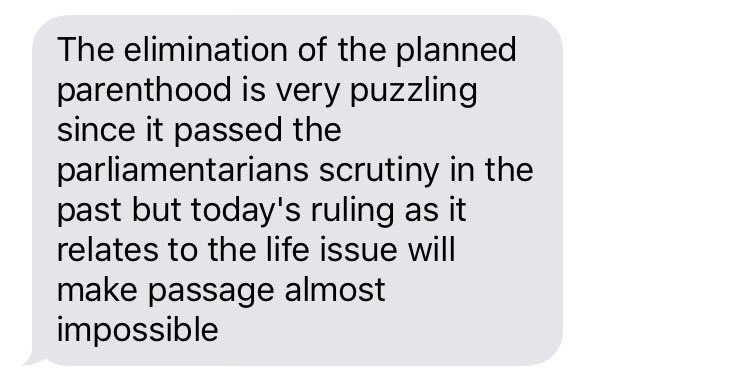Background on the Byrd Rule Decisions
The parliamentarian has made a determination that certain provisions of the Republican "Better
Care Reconciliation Act" released on June 26, 2017, violate the Byrd Rule. This means that,
should the Senate proceed to the bill, these provisions may be struck from the legislation absent
60 votes.
Notably, the parliamentarian has advised that abortion restrictions on the premium tax credit and
the small business tax credit, and the language defunding Planned Parenthood, violate the Byrd
Rule. Further, the "Buffalo Bailout" which was used to secure votes in the House has also been
found to violate the Byrd Rule – threatening other state-specific buy-offs.
Provisions Subject to a 60-vote Byrd Rule Point of Order
• Defunding Planned Parenthood: This section prohibits Planned Parenthood from receiving
Medicaid funds for one year. (Sec. 124)
• Abortion Restrictions for Tax Credits: Two separate provisions contain Hyde Amendment
language to prevent premium tax credits and small business tax credits from being used to
purchase health insurance that covers abortion. (Sec. 102(d)(1) and Sec. 103(b))
• Sunset of Essential Health Benefits Requirement for Medicaid: This provision states that,
beginning in 2020, states no longer have to cover essential health benefits in their Medicaid
alternative benefit plans. (Sec. 126(b))
• Funding for Cost-Sharing Subsidies: This section replicates current law by providing
funding for the subsidies through 2019. (Sec. 208)
• Stabilizing the Individual Insurance Markets ("Six Month Lock Out"): This section
imposes a six-month waiting period for individuals attempting to enroll in coverage in the
individual market who cannot demonstrate that they have maintained continuous coverage.
(Sec. 206)
• Medical Loss Ratio: This section allows states to determine how much insurers are allowed
to spend on administration, marketing, and profits versus health care. (Sec. 205)
• Availability of Rollover Funds: This provision allows states that spend less than their
targeted block grant amount to rollover funds to the following year and to use funds for nonhealth
purposes, specifically repealing the provision of the Social Security Act that prohibits
states from using Medicaid funds to build roads, bridges, and stadiums. (Sec. 134 –
1903B(c)(2)(D)) (Note: this provision has been removed from the most recent draft).
• Decrease in Target Expenditures for Required Expenditures by Certain Political
Subdivisions ("Buffalo Bailout"): This provision limits the ability of New York State to
require counties other than New York City to contribute funding to the state's Medicaid
program. (Sec. 133 – 1903(c)(4))
• Grandfathering Certain Medicaid Waivers; Prioritization of HCBS Waivers: This
section says that the Secretary will encourage states to adopt Medicaid Home and
Community Based Services (HCBS) waivers but does not set forth any actual details for this
plan. (Sec. 136)
• Reporting of CMS-64 Data (T-MSIS): This provision requires the Secretary of HHS to
submit a report on Congress recommending whether expenditure data from the Transformed
Medicaid Statistical Information System (T-MSIS) is preferable to data from state CMS-64
reports for making certain Medicaid decisions. (Sec. 133 – 1903(h)(5))
Provisions Not Subject to a 60-vote Byrd Rule Point of Order
• Medicaid Work Requirements: This provision allows states the option to impose work
requirements on Medicaid enrollees who are nondisabled, nonelderly, and nonpregnant.
Pregnant women are exempt from any work requirements for 60 days after giving birth. (Sec.
131)
• Providing Safety Net Funding for Non-Expansion States – This section provides $10
billion for non-expansion states. (Sec. 129)
• State Stability and Innovation Fund: This section includes abortion restrictions on funding
for the State Stability and Innovation Fund by tacking the Fund onto the CHIP program.
(Sec. 106)
• Equity Adjustment: This provision provides for adjusting the per capita cap targets of lowand
high-spending states to promote equity. (Sec. 133 – 1903(c)(5))
• Repeal of Cost-Sharing Subsidy Program: This section permanently repeals cost-sharing
subsidies beginning in 2020. (Sec. 209)
• Reporting of CMS-64 Data: This provision requires states to include information on per
capita cap enrollment and expenditures, psychiatric hospital expenditures, and children with
complex medical conditions in their Medicaid expenditure reports. (Sec. 133 -- 1903(h)(1))
Still Under Review
• Waivers for State Innovation (Essential Health Benefits): This section amends Sec. 1332
of the ACA to allow states to waive age rating, essential health benefits, and pre-existing
condition requirements so long as their proposal does not increase the federal deficit. (Sec.
207)
• Small Business Health Plans: This section would allow small businesses to establish
"association health plans" that could be sold across state lines. For regulatory purposes, these
plans would be treated as part of the large group market and thus would be exempt from
many ACA requirements such as covering essential health benefits. (Sec. 139)
• Change in Permissible Age Variation in Health Insurance Premium Rates ("Age Tax"):
This section allows insurers to charge older Americans at least five times more than what
they charge younger individuals. (Sec. 204)
• Flexible Block Grant Option for States: This section allows states the option to receive a
lump sum Medicaid "block grant" instead of the per capita cap payments. (Sec. 134)




